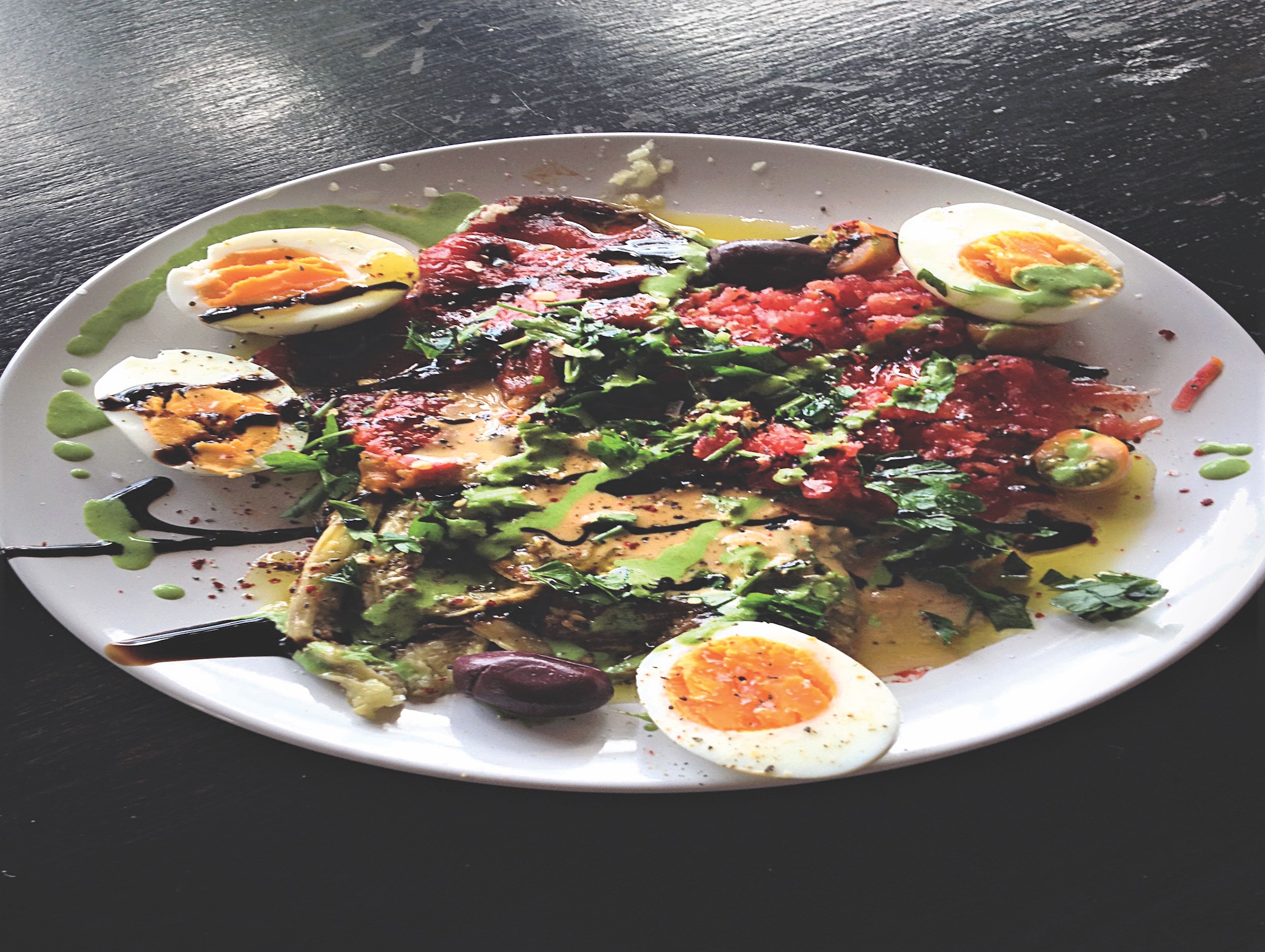
I’m sitting on the tarmac at Ben Gurion Airport. It’s been too many years since I’ve been home for what I’m afraid is a last goodbye to my beloved Aunt Dora, a woman whose influence on me in the kitchen, and in life, has been so profound that a world without her seems unfathomable. A phone call a few days prior from my cousin brought me to Israel from Uganda, where I work as the head chef at the U.S. Embassy in Kampala. After packing so quickly that I managed to forget one shoe out of each pair, I rushed straight from work to Entebbe Airport (yes, that Entebbe).
As always, my heart had pounded to the beat of the clapping passengers as the plane touched down in Israel. I usually laugh and clap along, but this time I’m expecting my cousins to pick me up and take me straight to the hospital, and my intuition tells me the trip will be no clapping matter.
My bag takes forever to exit the plane, so I have time to be struck by how familiar the smells are, how there is no place like Israel, no place that touches me the same way, smells the same way, for better and for worse.
My suitcase finally plops onto the conveyer belt and I grab it with impatient sabra hands to take the ever-familiar walk on shaky knees to arrivals. I see my Aunt Viola first and know immediately that my intuition didn’t fail me. I am too late. Dora passed away while I was en route, some hours prior, quietly and peacefully, following a devastating year of being confined to a wheelchair after losing the use of her arms and legs.
For the MVP of cooking in our large Bulgarian family in Israel, that chair must have felt like a prison. Being unable to cook for her grandchildren was a fate perhaps worse than death. So much so that she was gifted by my cousin with a cooking companion in the form of a caregiver named Alice. As I was to learn from my cousin, Alice’s job consisted mostly of wheeling Dora around the neighborhood supermarkets, picking out the best meat and produce, and then monitoring Alice’s hand-washing habits as she ordered her around her kitchen to re-create our family specialties to distribute to her granddaughters.
Dora came to Israel in 1948 at the age of 12 as part of a group of Zionist youth in the aftermath of the Holocaust. Like many of the intensely patriotic youth who went to Israel from that part of the world, Dora tried to create the happy childhood she never had through food and the recipes of her native Bulgaria. She was my mother’s “Gisa,” the Hebrew word for sister-in-law, and my father’s brother’s wife. She taught my mother and me through extension to cook. My mother, a Romanian Jew, was the first daughter-in-law on that side of the family who did not have Bulgarian roots, something I suspect was lamented on my father’s side until she showed promise as a fantastic cook, despite being Ashkenazi (gasp)!
That was all thanks to Dora, who at all times of the day and night could be counted on to answer the phone after my young parents snatched me away from her (her words) and immigrated to America. Those phone calls from my mother to Dora, back in the days when you had to order a call through an international operator and wait impatiently for them to ring you back, were my mother’s lifeline. Much of my youth was spent waiting for Dora’s input so that my mother could re-create some Bulgarian soul food from my father’s childhood that had been passed onto Dora from his mother.
In later years, when I had my own kitchen, it was me making those calls to Dora. When I opened my first restaurant, Dora’s techniques and kitchen hacks provided me with both an excuse to talk to her on an almost daily basis and a set of kitchen principles that have yet to fail me. I’m sure many of her recipes separated me from the rest of the pack by virtue of the originality of the Sephardic-Israeli kitchen that shows up so often on my menus. After I opened my second restaurant and then started working for the American embassy, these weekly phone calls persisted. Every Saturday, almost without exception, and particularly when I had a large catering event, I would call Dora and ask her for ideas and advice.
Many times during the shivah, in my Aunt Dora’s kitchen, we would look in the freezer where there were packed boxes of food, everything labeled and orderly, just waiting for her heating instructions. Never again would we annoy her by not bringing back the Tupperware containers so she could fill them up again. We knew that, even though we had watched her make some of our family-memory foods many times, in this freezer was the last real taste of her.
I’m back in Uganda now, cooking for this High Holy Days season in my own kitchen just like Dora would have. I’m starting to roast and peel the red peppers and eggplants the way she taught me. I’ve fallen in love with a preparation from her daughter Orly, who, like me, inherited Dora’s love of the kitchen. It’s something Orly would whip together for me after the long, hard days of the shivah, even though as the griever, she wasn’t supposed to cook, but she, like me, cooks for relief from stress and grief.
This knockout dish encompasses all the best of Dora’s kitchen and Orly’s more modern Mediterranean one, using fresh vegetables, vibrant colors and balanced flavors that develop inside your mouth with every new bite. Savory, warm, roasted and peeled eggplant and red peppers alongside freshly grated tomato drizzled with raw tahini is pure Dora-inspired food. Orly adds freshly picked chopped mint and parsley, a clove of chopped garlic, coarse sea salt, pepper and chopped fresh chili with a splash of silan (date honey) and a cascade of pomegranate seeds.
In addition to all of the above, I add a few Kalamata olives, an unashamed glug of extra-virgin olive oil and maybe some hard-boiled eggs. Then, because I usually am out of silan and can’t get it here in Uganda, I re-create the flavor profile with a sweet hit of balsamic reduction. Unfortunately, it’s not pomegranate season here, and pomegranates make this dish perfect for Sukkot.
When you’re in the kitchen, picture my Aunt Dora and I wishing you heartfelt good fortune and, in her words, “as many blessings as there are seeds in a pomegranate.”
Yamit Behar Wood, an Israeli-American food and travel writer, is the executive chef at the U.S. Embassy in Kampala, Uganda, and founder of the New York Kitchen Catering Co.























 More news and opinions than at a Shabbat dinner, right in your inbox.
More news and opinions than at a Shabbat dinner, right in your inbox.